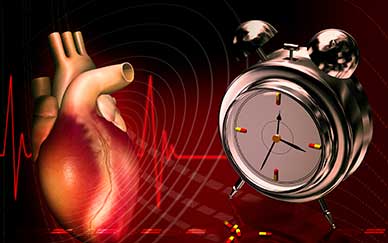With obesity reaching epidemic levels in the United States and much of the Western world, many people are struggling to lose a few (or more!) extra pounds. Often those wishing to lose weight strive to eat less and to fit more activity into their lives, only to be disappointed with minimal results. As a result, weight loss is becoming a huge national industry, yet one that does not often deliver on its promises for the average person. What if another factor besides caloric intake is contributing to our ever-expanding modern waistlines?
Could When You Eat Affect Your Health?
Our ancestors ate at regularly-scheduled times and often with their family or clan. However, this is not possible for many people now. Most of us have to grab a bite when we have the chance, between work, errands and social obligations. In addition, the availability of tasty and affordable snacks makes it easy to graze our way through the day. For many people, eating throughout the day and into the night has replaced proper meals and some diet systems even claim incorrectly that this is a healthy behavior.
For from being a healthy choice, eating multiple meals throughout the day—especially after a certain time of day—appears to be disastrous for our metabolisms. In fact, a recent analysis of current research suggests that when we eat may be a major factor in weight gain or loss. Shift work has been linked to metabolic syndrome, which is believed to be due in part to eating at odd hours. People who switch to eating most of their calories early in the day see increased weight loss and better blood glucose control. While we have no definitive causal link between eating at regular hours and keeping a trimmer waist, studies certainly suggest a correlation.
The Science Behind Regular Meals
 How can when you eat have such a huge effect on your weight and your health? Our bodies run on several internal clocks. Our metabolism, in particular, follows a circadian rhythm. Eating at the same times every day allows your body to plan ahead, ramping up insulin production and firing up your metabolism in anticipation of the meal ahead. If you do not eat at roughly the same times every day, your body cannot prepare itself on a hormonal level for metabolizing the calories you are about to take in.
How can when you eat have such a huge effect on your weight and your health? Our bodies run on several internal clocks. Our metabolism, in particular, follows a circadian rhythm. Eating at the same times every day allows your body to plan ahead, ramping up insulin production and firing up your metabolism in anticipation of the meal ahead. If you do not eat at roughly the same times every day, your body cannot prepare itself on a hormonal level for metabolizing the calories you are about to take in.
Eating in the evening appears to be an especially poor decision for metabolic health. Glucose control is stronger in the morning than in the evening, which means that eating regularly in the evening can lead to blood sugar fluctuations. These fluctuations may contribute to metabolic syndrome and type 2 diabetes over time. This may explain why people who eat most of their calories in the morning see such an improvement in blood glucose control and their weight. Even without changing their diet, they can control how carbohydrates are used.
Can a “Chronodiet” Lead to Better Health?
Planning when you eat appears to be as important as planning what you eat. Many people find success by following a “chronodiet” that aligns meal times with their body’s internal clock. Eating most meals between 11 a.m. and 4 p.m. helps many people to lose weight even when consuming the same amount of calories. In addition, planning when you eat different kinds of food can help. For example, it is best to eat most of your carbs in the morning when insulin (and thus blood sugar control) is at its highest levels.
Humans evolved to lead a lifestyle that is very inconvenient in the modern world. As a result, many people are struggling with their weight as metabolic syndrome and related diseases continue to rise. Planning when you eat so it aligns with the best calorie-burning times of the day may help many people to lose a few pounds while leading a longer, healthier life.
 Folic acid is arguably the
Folic acid is arguably the  Probiotics have been shown to support good health in several recent studies. For instance, dental cavities have been linked to an
Probiotics have been shown to support good health in several recent studies. For instance, dental cavities have been linked to an  Modern lives tend to be stressful, instigating the release of cortisol and other stress hormones that can lead to inflammation. The link between inflammation and our microbiome may be part of the explanation for the many healthy benefits of probiotics. In one study, when medical students were given probiotics before a test, they had
Modern lives tend to be stressful, instigating the release of cortisol and other stress hormones that can lead to inflammation. The link between inflammation and our microbiome may be part of the explanation for the many healthy benefits of probiotics. In one study, when medical students were given probiotics before a test, they had  It is no surprise that our bodies change as we get older, with the changes being more pronounced inside our bodies than on the outside. Our blood vessels become less pliant, paving the way for hypertension and a variety of cardiovascular diseases. Changes to the body’s circadian rhythm
It is no surprise that our bodies change as we get older, with the changes being more pronounced inside our bodies than on the outside. Our blood vessels become less pliant, paving the way for hypertension and a variety of cardiovascular diseases. Changes to the body’s circadian rhythm  Released by the pineal gland in response to cues from the suprachiasmatic nucleus (SCN) of the hypothalamus, melatonin had been a major focus of research for years due to its essential role in maintaining the circadian rhythm and a regular sleep-wake cycle. Melatonin levels typically
Released by the pineal gland in response to cues from the suprachiasmatic nucleus (SCN) of the hypothalamus, melatonin had been a major focus of research for years due to its essential role in maintaining the circadian rhythm and a regular sleep-wake cycle. Melatonin levels typically  Most children have a set bedtime, but as adults, we generally give up this habit. We go to bed when we feel ready for sleep, which varies from night to night. A new study published in the journal Hypertension suggests that bedtime may be more important than we could have ever predicted. In the study, healthy volunteers underwent a series of blood tests, then were given a
Most children have a set bedtime, but as adults, we generally give up this habit. We go to bed when we feel ready for sleep, which varies from night to night. A new study published in the journal Hypertension suggests that bedtime may be more important than we could have ever predicted. In the study, healthy volunteers underwent a series of blood tests, then were given a  Sleep is a time for mental regeneration, but it appears to be just as important for physical regeneration. Our cardiovascular system is not the only organ system that needs some time at night to regenerate cells and clean out toxic metabolites from the activity of the day.
Sleep is a time for mental regeneration, but it appears to be just as important for physical regeneration. Our cardiovascular system is not the only organ system that needs some time at night to regenerate cells and clean out toxic metabolites from the activity of the day.  The main problem with shift work is that the timing of sleep matters. Our bodies are made to run by
The main problem with shift work is that the timing of sleep matters. Our bodies are made to run by